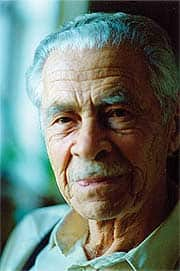Life Extension Magazine®
You would think that by the age of 105, Dr. Alexander Imich, a renowned parapsychologist, would be tired of people asking him about his “secrets of longevity.” But this thin, vibrant former scientist who still lives alone, continues to do research and writing, keeps up with friends through email and socializing, and walks briskly and unassisted through New York City streets, seems eager to share what he’s learned over his unusually long lifetime. Since early childhood, Dr. Imich has followed many practices now known to prolong human life: exercise, caloric restriction, healthy diet, supplementation, meditation, and pursuing multiple interests. Today, he looks and behaves like a much younger man, making it easy to believe he will continue to lead an active life for many years to come. In an exclusive interview with Life Extension magazine, Dr. Imich reveals details about his life and how he has faithfully developed and continued the practices that have led to his remarkable longevity. A Long, Eventful LifeBorn into a Jewish family in Poland, Dr. Imich was raised by a father who had hoped to become a doctor, but was pressured to go into the family business instead. With his great interest in health, Dr. Imich’s father taught his young son to pursue daily exercise, sports, and cold water ablutions, practices that Dr. Imich has continued throughout his life. “I was an active sportsman,” says Dr. Imich, “and participated in soccer, boxing, running, jujitsu, javelin, discus, skiing, sailing, and swimming. I even took fourth place in one of the Polish swimming finals.”
With his love of nature and animals, he decided to enter the field of zoology, obtaining his PhD in 1929, but only after switching his major from zoology to chemistry. When World War II intervened, Dr. Imich, then married, traveled on foot and by horse and buggy to Bialystok in Poland, which at that time was occupied by the Russians. “They welcomed me saying, ‘A chemist and a PhD! We need such people,’” he recalls, and he soon began organizing a small manufacturing unit to produce cosmetics. But trouble came when he refused an offer to become a Russian citizen. “Not long after my refusal,” he explains, “three NKVD officers [secret police] knocked on my door at night and ordered us—my wife had joined me by then—to take all our possessions and go with them.” The couple ended up on a train full of Polish citizens, which, after a three-day journey, deposited them in a labor camp in the far north of Russia, where they were informed, “here you will work and here you will die, because you are enemies of our government.” He and his wife endured three years of temperatures as low as -50 ˚C, small portions of often inedible food, and constant physical toil. Liberated after the war, Dr. Imich and his wife returned to Poland to discover that almost all of his extended family had been wiped out by the Nazis. They lived in Samarkand, Russia, and France, but as Dr. Imich says, “I was convinced that Russians would take the rest of Europe,” so they immigrated to the United States in 1952. Starting off in Connecticut and then moving on to other areas, Dr. Imich made a career for himself in chemistry, working in research labs and large industrial companies. His wife had many different occupations, ending up as a successful psychotherapist in New York City. After she passed away in 1986, he moved into her small office and has lived there ever since. Due to bad financial decisions, he lost his life savings and has been forced to live frugally for the past few years. However, this has not diminished his positive outlook on life or the pursuit of his multiple interests. Early Interest in Life Extension and Supplements
“My encounter with the world of vitamins began rather early,” notes Dr. Imich. “One of my colleagues was a nephew of the Polish-born scientist Casimir Funk, who coined the term ‘vitamin’ and identified vitamin B1. Then in 1982, I found the great bestseller, Life Extension, A Practical Scientific Approach, by Durk Pearson and Sandy Shaw. I corresponded with them and also subscribed to their publication Life Extension Newsletter for as long as they published it.” Inspired by the book and its authors, he began to make a serious study of vitamins and minerals and has added many new supplements to his intake since then. Supplements“I have taken many different nutritional supplements over the years,” says Dr. Imich, “and today the list is very long.” It includes vitamins: A, C, D, E, B1, B2, B6, and B12; minerals: calcium, magnesium, zinc, selenium, copper, manganese, and chromium; and supplements: inositol, ginger, phosphatidylcholine, bromelain, milk thistle seed extract, grape seed extract, flaxseed lignan, ellagic acid, bilberry extract, olive leaf extract, apple polyphenol, bromelain, lutein, panthetine, lycopene, sulforaphane, resveratrol, zeaxanthin, sunflower seeds, coenzyme Q10, garlic, mangosteen, pomegranate, noni complex, ashwagandha, hyaluronic acid, glucosamine and chondroitin sulfate, seaweed vegetable complex, and turmeric extract. Dr. Imich continues to keep up with the literature and may further modify his intake as he sees fit. Diet and Caloric RestrictionHis good friend, Dr. Donald Morse, says that Dr. Imich “practices under-nutrition, basically eating small portions of healthy foods, fruits and vegetables, fish, white meat, chicken, and practically no sweets.” He describes a meal they shared, in which Dr. Imich consumed only a small portion of his food and had the rest wrapped up to take home, saying that it would last for at least two meals.
“According to the latest findings,” Dr. Imich remarks, “mice on reduced calories live up to 30% longer. When I am with friends, I stop eating while they still continue. Consuming less food might be a significant factor in my longevity.” What does he eat? Dr. Imich says his diet consists of whole grain bread, fruit (except grapes), vegetables, seeds, nuts, legumes, soy products including tofu, fowl without the skin, fish, and a minimum of six glasses of alkalized water daily. He does not eat any red meat, cheese, eggs, white flour baked goods, potatoes, sugar, or fried foods, nor drink cow’s milk, coffee, or alcoholic beverages, except red wine. He also does not drink tap water or smoke. He adds that he smoked a pipe and cigarettes as a younger man, but stopped over 50 years ago. Genetic FactorsNo matter how religiously you follow the recipe for longevity, there is still the influence of your genetic factors. As you may have guessed, Dr. Imich has had some positive and possibly significant help in this area. “My parents perished in a German concentration camp when they were in their seventies,” he explains. “My grandfathers on both sides died in their nineties. My older brother also died in his nineties. It is evident that I have longevity genes,” he concludes. The US currently has the greatest number of centenarians in the world, with more than 90,000 in 2008, which is partly ascribed to our large population, but also to the quality of medical care and continuing advances in the health field. Experts agree that this number will increase in the future, with average life spans growing over time. One estimate is that there will be over a million centenarians in the US by 2050. Of today’s centenarians, about 85% are women, making Dr. Imich even more of a rarity. Lifestyle InfluencesIn addition to his diet, supplement, and exercise routines, Dr. Imich also follows certain lifestyle choices that may well contribute to his long, healthy life.
“I have always been concerned with proper life regimens for maintaining good health,” he says. “Consequently, I always go to bed at 11 pm and start the day at 7 am. My bed has a firm mattress, which is placed on a wooden board. When I get up, I bathe, then meditate for 10 minutes, do physical exercises for 10 minutes, and then eat breakfast.” His first meal of the day usually consists of oats with lecithin, whole grain bread with hummus or tofu salad, followed by vitamins and nutritional supplements. As for his exercise practices, Dr. Imich remembers that when he was 16, he wanted to become a yogi and live in a Himalayan cave. By the time he was 24, he had begun corresponding with several yogis and started doing hatha yoga exercises with a group of friends. “I have a great hunger for knowledge,” he adds, and has pursued his specialized interests, including paranormal phenomena and astronomy (Dr. Imich has a small telescope in his home and avidly follows developments in this field, some of which he terms “sensational”), on a regular basis throughout his life. In his personality and outlook on life, one could call Dr. Imich a “futurist,” since he is always thinking ahead, wondering what will become of us humans and the world we live in. “I have seen many changes during my life,” he notes, “from kerosene to electric lights, from the first automobile in my city, the first airplane landing on a meadow outside the city, the first radio station in continental Europe, the omniscient computer, and man walking on the moon.” He predicts that in the future, we will have methods to avert war, achieve universal education, and travel without the need for outside vehicles. His mind is obviously quite active and he is relentless in following his curiosity about almost everything. Alexander Imich’s Keys To LongevityAfter more than a century on earth, with a mind that still works quite well—perhaps better than ever—and a body that remains remarkably youthful, Dr. Imich’s list of his keys to longevity are well worth considering. And as a scientist, he is always careful to research his material before drawing any conclusions, so we can be certain his ideas have been well thought out.
For Alexander Imich, it has been a long and fruitful life. But you can’t help thinking, as unlikely as it may seem, that maybe he is just getting started. If you have any questions on the scientific content of this article, please call a Life Extension Health Advisor at 1-800-226-2370. |





